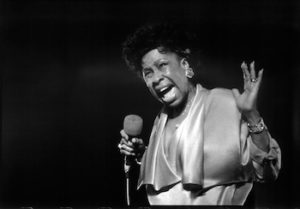
Betty Carter
Betty Carter was born on this date in 1930. She was a Black singer and entertainer.
She was born in Flint, Michigan, as Lillie Mae Jones (her birth name). She began studying piano at the Detroit Conservatory of Music. As a teenager, she was already sitting in with Charlie Parker and other bop musicians when they performed in Detroit. After winning a local amateur contest, she turned professional at age 16, hooking up with the Lionel Hampton band by 1948 and using the name Lorraine Carter. Hampton was responsible for her nickname "Betty Bebop" (a nickname she disliked, as she found bebop limiting and wanted to do more than just scat), but it stuck, and ultimately, she changed her stage name to Betty Carter.
At 21, she traveled to New York with the Hampton band and set up a home there. Carter spent the early 1950s as a singer with different groups. She did several shows at the Apollo with Max Roach and Dizzy Gillespie. She toured with Miles Davis in 1958 and 1959 and spent much of the rest of the time on the outskirts of the jazz scene. Carter made her first recordings in 1955 with Ray Bryant, the then-unknown piano player. The album "Meet Betty Carter and Ray Bryant" was poorly received, and her second set of recordings, with the Gigi Gryce band in 1956, was unpublished until 1980. By 1958, she was ready to record again, and another little-known album, "I Can't Help It," was the result.
A recording followed it closely on Peacock Records (a Texas gospel label), "Out There." She was developing a reputation as a fiercely independent woman (an attitude she developed based partly on her interactions with Gladys Hampton, Lionel's no-nonsense wife), but critical and widespread acclaim eluded her. Even a move to the ABC label for her 1960 album "The Modern Sound of Betty Carter" did little to help that. On a Ray Charles recommendation from Miles Davis, they agreed to take Betty on tour with him in the late 1950s.
Enchanted by her voice and looking for a partner to record a series of duets, he enlisted Ms. Carter in a project that became Ray Charles and Betty Carter. The album, recorded in 1961, became an instant critical and popular smash; the single "Baby It's Cold Outside" gave Betty her first introduction into the popular music scene. The sessions took on almost legendary status; after 15 years in the business, fame had found Betty Carter. She was raising two sons, Myles and Kagle Redding, and chose to concentrate on that rather than capitalize on her recent success. By 1969, though, Betty was ready to get back into music.
Unable to drum up enough interest and tired of trying to satisfy the demands of recording companies, she came up with a solution: she started her own company. Bet-Car was founded in 1971 and would be the sole source of her recordings until she signed with Verve in 1988. They were looking for under-appreciated jazz singers, signed Carter to a contract, and set about re-releasing most of her old material. In 1988, she returned with "Look What I Got," the album that earned her only Grammy award.
The next decade produced several more outstanding recordings that featured a more mature sound, Betty Balladeer instead of Betty Bebop. She continued to feature young, up-and-coming musicians on most of her albums, a practice broken only on the 1994 album "Feed the Fire." Betty continued developing new musicians through the ”Jazz Ahead “program, founded in 1993. She performed at the White House in 1994 and was a major headliner at Verve's 50th-anniversary celebration in Carnegie Hall.
She continued to stay active with her teaching until her death from pancreatic cancer on September 26, 1998.
Heart & Soul
A Celebration of Black Music Style in America 1930-1975
by Merlis Davin Seay, Forward by Etta James
Copyright 2002, Billboard Books
ISBN 0-8230-8314-4